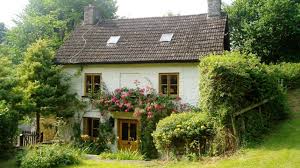记忆方法
将“cottage”想象成一个可爱的小屋(cute),它是由“cot”(婴儿床)和“-gage”(来自“cage”,笼子)组合而成,形成了一个像小笼子一样温馨的小屋形象,便于记忆。
以上内容由AI生成, 仅供参考和借鉴
中文词源
cottage 村舍,小别墅
来自古英语cote,村舍,小屋。
英语词源
- cottage
-
cottage: [14] The Old English words for a small house or hut were cot and cote, both of which survive – just: cot as an archaic term for ‘cottage’ and cote in dovecote and sheepcote. (Cot ‘child’s bed’ [17], incidentally, is of Hindi origin.) They both derive ultimately from a Germanic base *kut-. Then, probably in the 12th century, one or both of them seem to have been taken up by the language of the gentry, Anglo- Norman, and had the suffix -age added, giving *cotage, which was eventually adopted by English as cottage.
Originally this simply denoted any small humble country dwelling; it was not until the mid-18th century that it began to acquire modern connotations of tweeness.
=> cot, cote - cottage (n.)
- late 13c., from Old French cote "hut, cottage" + Anglo-French suffix -age (probably denoting "the entire property attached to a cote"). Old French cot is probably from Old Norse kot "hut," cognate of Old English cot, cote "cottage, hut," from Proto-Germanic *kutan (cognates: Middle Dutch cot, Dutch kot).
Meaning "small country residence" (without suggestion of poverty or tenancy) is from 1765. Modern French cottage is a 19c. reborrowing from English. Cottage industry is attested from 1921. Cottage cheese is attested from 1831, American English, earliest in reference to Philadelphia:There was a plate of rye-bread, and a plate of wheat, and a basket of crackers; another plate with half a dozen paltry cakes that looked as if they had been bought under the old Court House; some morsels of dried beef on two little tea-cup plates: and a small glass dish of that preparation of curds, which in vulgar language is called smear-case, but whose nom de guerre is cottage-cheese, at least that was the appellation given it by our hostess. ["Miss Leslie," "Country Lodgings," Godey's "Lady's Book," July 1831]
权威例句
- 1. The studio is midway between his aunt's old home and his cottage.
- 工作室就在从他姑姑的老宅到他的小屋的中途。
- 2. Curtis got behind the wheel and they started back toward the cottage.
- 由柯蒂斯开车,他们启程返回小屋。
- 3. My sister Yvonne also came to live at Ockenden Cottage with me.
- 姐姐伊冯娜也来到奥克肯登小屋和我一起住了。
- 4. Tony had risen early and gone to the cottage to work.
- 托尼很早就起来去小屋干活了。
- 5. He is incommunicado in a secluded cottage in Wales.
- 他隐居在威尔士一个偏僻的小村舍里。
